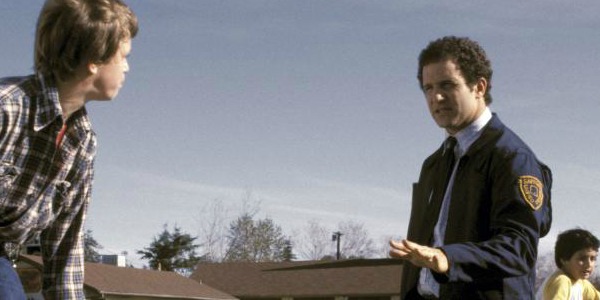LOST IN AMERICA: Optics Of The Low Road

Ben is a former student of cognitive science who is…
A little too often, self-deprecating comedies by middle-aged American men fall either into sentimentality or obfuscation. The former are those whose inability to stay detached ultimately leads them to facile resolutions; the latter are those supposedly sophisticated films which take place from a particular character’s “perspective” and freely indulge in whatever behaviors they purport to criticize. For all that these can be funny and emotionally effective, they embody a kind of fence-sitting which is easily mistaken for insightful ambiguity.
For an example of the alternative, consider Albert Brooks‘s Lost in America, a new edition of which will be released by the Criterion Collection this July. Lost in America cuts right to the heart of its main character’s delusions, the problems that gave rise to those delusions, and the problems they cause in turn. It’s not just that this film’s humor is at the main character’s expense; it’s that it takes the form of genuinely caustic derision. It never asks us to like the main characters, nor does it confuse understanding with empathy or justification.
Not So Easy
Lost in America follows David and Linda Howard (Brooks and Julie Hagerty, respectively), a couple living in Los Angeles. After David’s boss asks him to move to New York City for work, David insults him, and is fired in turn. He and Linda decide that such problems are beneath them. They resolve to stop working and instead spend the rest of their days traveling the country in an RV and living on their remaining savings, which they intend to spread over the years by living on a small budget.
At several points throughout the film, David mentions that he was inspired to “drop out” of society by the film Easy Rider. He invokes Easy Rider more than once over the course of the film, even after his and Linda’s plans start to fall into disaster. Each invocation seems more frivolous and myopic than the last, and Linda eventually points out why: the characters in Easy Rider had no saved money; they lived an unlikely, romanticized life. David’s idea of “dropping out” is inadequate, drawn from a film that doesn’t show the reality of what it is to be poor in America.

Lost in America isn’t Albert Brooks‘s only film to reflect on cinema. Take, for instance, Modern Romance and Defending Your Life, the films he wrote and directed before and after Lost in America, respectively. Both use cinema as a device to explore their characters’ anxiety about lacking control over their surroundings. But I digress, because Lost in America more closely resembles Brooks‘s first film: Real Life.
Real Life and Lost in America don’t use film or filmmaking as a device so much as they address films as popular phenomena, and their consequent potential to limit and deceptively shape what people at large conceive of as normal. As it turns out, the detachment with which Lost in America approaches its main character does more than drive the film’s humor: it also allows the film to look at David’s delusions from a perspective that exposes how the world influences them, preys on them, and tolerates them.
Third-Person Eyes
Lost in America makes its detachment visible in the way the camera rarely gets close to the characters or places us in any one character’s perspective. Its most visually memorable scene is one of the most distant: it comes with one of David’s most self-righteous outbursts, and throughout, the camera captures the size and jagged angles of the environment, diminishing the characters by contrast. It’s a moment in which we can see David trying to force things into his schemata, but the world’s shape just doesn’t fit.

Though the character’s points of view are easy to understand, the film avoids emphasizing things that fall within their scope. Rather, we’re reminded that the film’s world is full of things beyond that. It becomes obvious that David doesn’t know nearly as much as his attitude suggests he thinks he does. Linda doesn’t come off much better, but at least she doesn’t mix myopia with imperiousness the way David does.
This ends up being a good set-up for the film’s ending. At first glance, it might seem sudden, incomplete, and just a little too easy, but it exposes just how much sway the characters’ blinders hold over their lives, and how much incentive there is to adopt them. Without giving too much away, Linda and David simply withdraw from the situation they’ve found themselves in, and embrace the conditions that led to and fed on the fantasies they had at the beginning of the movie.
To Conclude
Brooks‘s films achieve heights that other, superficially similar films don’t, and it shows the significance the perspective a film takes, and the formal subtleties that go into that. Lost in America not only embodies this, but recognizes why it can also be important for viewers to understand differences of perspective, and look at the films they watch with a discerning eye. Of course, it takes little effort to simply enjoy Lost in America, as it’s one of the funniest films from one of our greatest cinematic comedians.
What other films rely heavily on a perspective outside those of the characters?
Lost in America was first released in 1985. It will be released on Blu-ray by the Criterion Collection on July 25, 2017. It is also available for streaming on Netflix and Amazon Instant Video.
Does content like this matter to you?
Become a Member and support film journalism. Unlock access to all of Film Inquiry`s great articles. Join a community of like-minded readers who are passionate about cinema - get access to our private members Network, give back to independent filmmakers, and more.
Ben is a former student of cognitive science who is currently trying to improve his writing style and ability to understand and appreciate films containing unfamiliar perspectives. He tries not to hold films to a strict set of criteria, but does believe that strong movies can change your outlook on the world. His favorite films include Whisper of the Heart, Hellzapoppin', Foolish Wives, 42nd Street, and the work of Charlie Chaplin.













